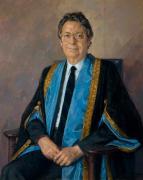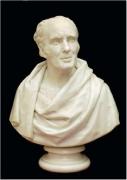Sir Peter Froggatt was one of Ireland’s foremost medical figures, who played a key role in university and public life during a career which spanned over half a century. His major contribution to medicine involved not only his time as Professor of Epidemiology and later Dean of the Faculty of Medicine at Queen’s University Belfast, but also many papers and articles including important work on the history of medicine. He served as Vice-Chancellor and President of Queen’s, 1976-86, during a time of austerity and the challenges of the “Troubles”. After retiring from his Queen’s position he continued to play an important role in public life. His international reputation was reflected in his receipt of honorary degrees and civic awards and in his honorary membership of a number of learned societies.
He was born on 12 June 1928 in Glasgow, the son of Albert Victor Froggatt, a Londoner who resettled to Belfast before the Great War, and Edith (née) Curran of Myrtlefield Park, Belfast. The family moved back to Belfast when he was very young and he attended the Royal Belfast Academical Institution. Following the Belfast blitz of 15 April 1941 his parents moved him from city centre Belfast to rural Royal School Armagh. In 1945 he joined the RAF cadets as a trainee navigator but the war ended before he took an active role. He then decided to study medicine. Long standing links between Royal School Armagh and Trinity College, Dublin influenced his decision to attend Trinity rather than Queen’s. He entered Trinity in September 1946.
From Trinity he received the degrees of BA in 1950, MB in 1952 and MD in 1956. He held a resident medical and surgical post at St Patrick Dun’s Hospital, Dublin (1952-3). This was followed by a period in general practice in Dublin and Belfast, 1953-5. He was a post graduate student at Queen’s 1955-6, studying for a Diploma of Public Health, leading to a research fellowship in the Department of Social and Preventive Medicine at Queen’s, 1956-7. The next two years were spent as assistant industrial medical officer to the distinguished Dr James (“Jim”) Smylie at Short Bros & Harland Ltd.
In 1959 he was appointed to a lectureship in the Department of Social and Preventive Medicine at Queen’s. Subsequently he was made Reader in 1965 and promoted to a personal chair as Professor of Epidemiology in 1968. He received a PhD from Queen’s in 1967. In 1971 he was elected Dean of the Faculty of Medicine in succession to Sir John Henry Biggart. As Dean he introduced a number of important changes in the clinical teaching of medical students, including the establishment of new departments. He was instrumental in the building of the Whitla Medical Building.
He was elected a Fellow of the Royal College of Physicians of Ireland in 1973, a Member of the Royal Irish Academy in 1978 and a Fellow of the Royal College of Physicians in London in 1980. He was a foundation Fellow of the Faculty of Community Medicine at the Royal College of Physicians in London in 1973 and the Faculties of Occupational Medicine (1975) and Community Medicine (1976) of the Royal College of Physicians in Ireland.
During his career, he was the author of one book and some 130 journal articles on human genetics, occupational medicine, medical history , medical education, epidemiology and smoking policies. Special historical nterests included Sir William Wilde, the distinguished nineteenth-century surgeon and chronicler of famine and disease in Ireland, and the early Belfast medical school. He delivered many lectures and papers to learned societies in Ireland, Great Britain, Canada and The United States of America. Of particular note in Sir Peter’s experience abroad was his work as research participant for the American College of Cardiology, the National Chest and Lung Institute, and the National Institute of Child Health and Human Development.
In 1976 Sir Peter became Vice-Chancellor and President of Queen’s University. The decade which followed was a time of considerable financial difficulties for all UK universities with reduced government funding. At the same time rising student numbers created additional demands on universities. In his first Annual Report to Senate for 1976-7 he warned: “Seldom can the financial situation have been so uncertain or so unpredictable”. In 1976 Queen’s contained 6680 students and 750 full-time staff. Ten years later there were 8553 students and 649 staff. During these difficult years, as Alf McCreary has written, he “presided over Queen’s with characteristic good humour and stoicism”. He managed the cuts with considerable diplomacy while driving new initiatives. In his final Annual Report in 1986 he noted: "Some things have been shaken up: nothing I hope has been shaken to pieces".
These years witnessed some of the worst incidents of the “Troubles”, including the murder of two staff members, Miriam Daly and Edgar Graham. In the face of such challenging political and violent times, Sir Peter led the university with both empathy and skill. In his 1981-2 Annual Report he wrote: “Political instability is unstabling no doubt, North and South, but there is more to life than politics, and the Irish universities can take pride in the role they have played, especially this century, in ensuring that Ireland, despite its outrages and its intolerant and violent groups, provide no less a civilised, safe and cultured environment than the rest of the developed world, adding its share to the rich endowment of nature”.
During his years at Queen’s Sir Peter played a major role in public life, especially in Northern Ireland but also elsewhere. He served as chairman of the Independent Scientific Committee on Smoking and Health UK),the Tobacco Products Research Trust and the Scientific Advisory Committee of the Foundation for the Study of Infant Death (UK). In Northern Ireland he was President of the National Deaf Childrens’ Society (NI) and Age Concern (NI). He was also Vice-President of the Ulster Cancer Foundation , the Northern Ireland Chest, Heart and Stroke Foundation and the Northern Ireland Association for Mental Health.
This role in public life continued after he stepped down as Vice-Chancellor of Queen’s in 1986. He retained his interest in the earlier bodies but became involved in additional organisations. He was President of the Northern Ireland Council for Voluntary Action and Marriage Guidance (NI). He became chairman of Co-Operation North and of the Trustees of the Scotch-Irish Trust and the Mellon Centre for Migration Studies. He was a director of The Ireland Funds and the American Ireland Fund. He served on the Advisory Committee for Northern Ireland of the British Council and the General Advisory Committee (UK) of the BBC.
He was President of the Belfast Literary Society and became Chairman of the Ulster College of Music. Every year at the Belfast Musical Festival he presented the Edith Froggatt Chalice, named after his mother, for vocal repertoire. There was a strong family musical tradition. His father had sung with the Glasgow Orpheus Choir and had been organist at St Bartholomew’s Church, Stranmillis. During his time as Vice-Chancellor he gave strong support to the Belfast Festival at Queen’s and its Director, Michael Barnes OBE. He was a member of the Ulster History Circle and latterly one of the principal contributors to its Dictionary of Ulster Biography.
Sir Peter received many honours and distinctions. He was created a Knight Bachelor in 1985. He was awarded an honorary LLD by Trinity College Dublin in 1982, an honorary DSc by the National University of Ireland in 1982 and an honorary LLD by Queen’s in 1991. In 1985 he was appointed a Pro-Chancellor of Dublin University, in which capacity he conferred honorary degrees on inter alios Nelson Mandela and Mikhail Gorbachev. He was elected an Honorary Fellow of the Royal College of Medicine of Ireland in 1982. He was presented with the Corrigan Gold Medal of the Royal College of Physicians of Ireland in 1981. He was made an Honorary Fellow of the Royal College of Surgeons in Ireland in 1988. In 1986 he was appointed Honorary Professor and Faculty Member of St Bartholomew’s Hospital Medical School, London. In 1990 he was made a Freeman of the City of London. The Peter Froggatt Centre at Queen's University is named for him. His portrait by Michael Noakes hangs in the Great Hall of the University.
In 1958 he married Norma Cochrane of Stranmillis, Belfast. They had sons Mark, Richard, Ian and Keith. Another son Bruce died shortly after birth. Lady Froggatt was a respected and popular consort at many University occasions and was herself involved in education as a governor for very many years of Victoria College, Belfast.
Sir Peter was an accomplished sportsman. He played in the Ulster Schools Cricket Team, 1945-6, and was on the Ulster Golf Team, 1956-8, and on the Irish Senior Golf Team in 1957. He was a member and Elder of Elmwood Presbyterian Church and later of the merged Elmwood and Crescent Presbyterian congregations based at the Crescent. When the church closed in 1975 the family then attended McCracken Memorial Church where Sir Peter was an active member of Session and sang in the choir.
After his decease on 3 May 2020, colleagues paid tribute to his personal qualities. Professor Leslie Clarkson, a former Queen’s Pro-Vice-Chancellor, described him as a “very good historian and kind and helpful as a colleague”. Professor Robert Stout, Dean of the Faculty of Medicine and Health Sciences at Queen’s from 1991 to 2001, spoke of his distinguished contribution to Queen’s. Among his attributes, he referred to his talent as a lecturer and public speaker: “He had a great way with words, combining humour with historical and literary allusions, and his words were delivered with style”. He remarked: “Sir Peter was a warm and friendly man, who will be remembered with great affection by all those who knew him”.
| Born: |
12 June 1928 |
| Died: |
3 May 2020 |













